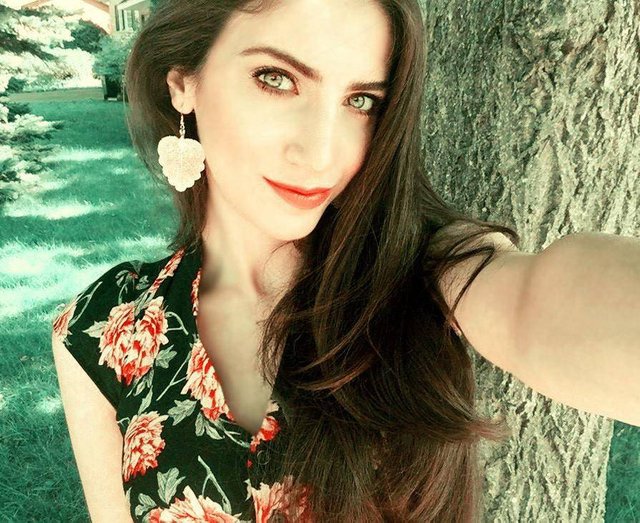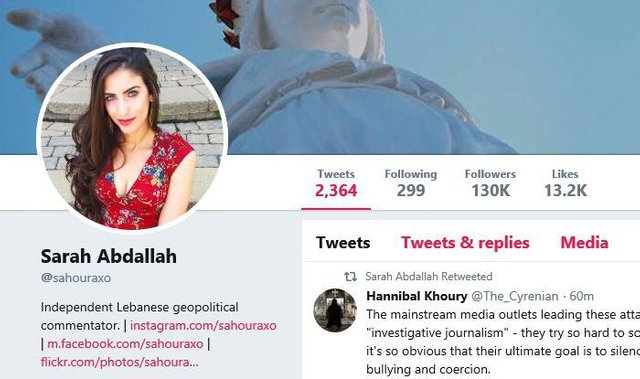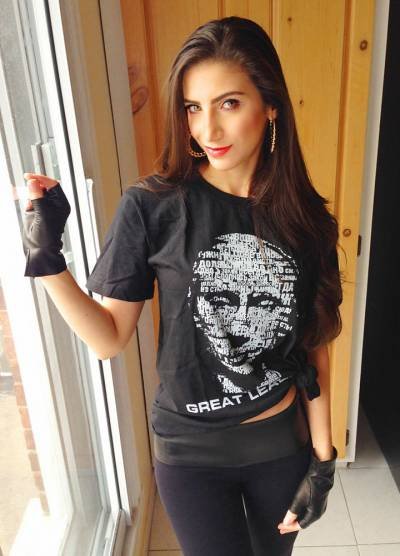'I'm Just a Girl Who Likes to Tweet About Syria - I'm Real' - We Chat with Sarah Abdallah, the Girl the BBC Loves to Hate
"... yes I am a real person. Yes, I’m the girl in the photos; these are my personal photos. Yes, I operate my own Twitter account (and all my other social media accounts) all by myself."
Note from the editor: Is she real or is she an irresistible propaganda concoction? The Guardian's former Middle East editor speculated in an April article investigating herthat she is "mysterious and possibly fictitious".
We've made it clear here at RI that as long as someone is doing serious journalism, we don't care if they are using an avatar or not. We regularly publish SyrianGirl, who is real, although accused of being a bot, (we've met her), and and Sophie Mangal (who apparently is not, but she does good work).
Whoever she is, she's very bright and interesting and very good at making the BBC look very dumb. Regular contributor Daniele Pozzati catches up with the lovely Sarah.
The BBC described Sarah Abdallah as “one of the most influential Twitter users commenting on (…) the conflict in Syria”, and her follower count, now in excess of 134K, as “comparable to BBC journalists who regularly report on Syria”.
Not fond of such competition, the BBC dismissed Sarah and other Twitter users who challenge mainstream narratives as “online activists pushing conspiracy theories”.
Anyone who questions MSM narratives today is immediately branded as “conspiracy theorist” by journos and politicos alike. It has become the establishment’s preferred way to pre-empt any discussion and instantly brush aside any criticism.
In typical mainstream fashion, the BBC did not enter into any point raised by Sarah’s tweets: it basically dismissed her remarks because they contrast the official, western governments-driven narrative – a narrative the BBC itself never tires to parrot.
the truth is, Levantine women are among the most beautiful, diverse and politically aware in the world.
Russia Insider talked to Sarah Abdallah via email, who in her Twitter profile describes herself as “independent geopolitical commentator”, to discuss the Syrian war, western media coverage of it, the role of Israel in the region, and what hopes there are for the settlement of a conflict that has now entered its 8th year.

Sarah, since the BBC’s source, the American social media research company Graphika, found out about your remarkably successful Twitter account there has been speculation about your identity. Brian Whitaker, former Middle East editor of the Guardian, wrote that: “it’s hard to find evidence of her life outside social media,” and pointed out that a website linked to your Twitter profile is empty. What’s more, Whitaker seems to suggest that you might be linked to Hizbullah. How would you answer such allegations?
I am politically independent and have zero connection to Hezbollah or any other political organization or government for that matter.
I am a very private person and am going to keep it as such. I am not a journalist or a reporter nor have I ever claimed to be one. I’m just a Lebanese girl with a Twitter account who likes to tweet about Syria
I find it rather funny that these “journalists” never question or attempt to debunk the content of my writings, but rather rush to question and attack my identity instead. I think this tells a lot about the way they operate and what truly lies behind their agenda. My identity was never questioned before I started posting controversial political tweets and my Twitter account got some visibility. But now suddenly they want to know every detail of my life.
However, for the sake of clarity and to respond to their attacks and speculations, let’s set some things straight: contrary to the smear pieces of the BBC and Brian Whitaker, in which he disparagingly refers to me as “the Sarah Abdallah Twitter account”, yes I am a real person. Yes, I’m the girl in the photos; these are my personal photos. Yes, I operate my own Twitter account (and all my other social media accounts) all by myself.
On a further note, this isn’t the first time Mr. Whitaker has shown his faulty and bias judgment about the identity of others. He previously promoted a hoax with the “Gay Girl In Damascus” (who was actually an American man named Tom McMaster posing as a Syrian lesbian named Amina Abdallah Arraf al-Omari) because this particular account pushed an agenda that Mr. Whitaker liked.

The BBC said that “little is known about you”.
Although I have had a large presence on various social platforms (Twitter, Facebook, Instagram, etc.) for years, the reason why there’s not a lot of information about me or what I do offline is because I intended for it to be that way.
One’s personal life is called a personal life by design. I am a very private person and am going to keep it as such. I am not a journalist or a reporter nor have I ever claimed to be one. I’m just a Lebanese girl with a Twitter account who likes to tweet about Syria and the Middle East and, again, I'm trying to keep my personal life private and far away from the political sphere.
What is so shocking about that? Moreover, what exactly is so wrong with that?
So why do you think the BBC is so skeptical about your very existence?
The insinuation from the BBC was so absurd that I took a photo and shared it with my followers on Twitter that said, “Hey BBC! I'm not a bot!” (https://twitter.com/sahouraxo/status/988787030426603520 …)
I believe the assertions made by the BBC, Whitaker and others are rooted in the orientalist notions, which are deeply embedded throughout Western media and British state media especially, that an Arab woman can’t be opinionated and vocal, challenge the mainstream narrative and dress in a way that doesn’t conform with mainstream prejudices.
But the truth is, Levantine women are among the most beautiful, diverse and politically aware in the world. And my detractors would know this if they were to visit our region and objectively speak to those who have taken a brave, categorical stance against terrorism, instead of writing against dissident voices from their cushy London offices.
Will ordinary people react against the smearing of anyone who dares to challenge the mainstream narrative? Or have they become so accustomed to it as to barely notice it?
I believe regular citizens are already reacting against the mainstream media’s trend of smearing dissident activists by disconnecting themselves from its narrative. I also believe that this is the reason for the very slander in the first place. People like Syrian Girl, myself and a great many others are being labeled as such because we’re effective and are having an impact on the narrative and cutting into mainstream media viewership/readership.
Your everyday news-seeker is more likely these days to go to a YouTube channel or a Twitter account to get his or her information instead of say, CNN or the BBC, because they know the aforementioned outlets are operating with a clear agenda.
Your Twitter account, now in excess of 130k followers, has been a resounding success. How did it begin? What might explain its success? What is its USP (unique selling point)?
I started my Twitter account because I wanted to offer an alternative viewpoint about Syria. And to be honest, there’s no unique selling point at all. If I was able to gather such a huge following, I believe it is because, as stated above, people are more interested in independent, genuine geopolitical reporting and commentary than the same false pretenses that the mainstream media keep pushing to further its agenda. I’m grateful for everyone who follows me and the support I’ve gotten in the wake of BBC’s smear piece especially has been both humbling and tremendously encouraging.
Maurizio Blondet, a senior, Catholic Italian journalist, describes the Middle East as "the place of the mixed", where thousands year-old human cultures and spiritual traditions not only coexist, but are so entwined as to form "an amazing coral reef" - every bit as beautiful and fragile as the real ones.
On Twitter you Sarah post pictures of president Assad visiting Christian monasteries, or his wife Asma lightening candles inside Christian Churches. According to Blondet it is in fact quite common for Muslims to pray inside Christian places such as Maaloula in Syria.
Is your Twitter account somehow a reflection of all this?
Without a doubt, Syria has a society and a culture that have incorporated pluralism at every turn. Contrary to what you read in the Twitter feeds of clueless Neocon think tankers, you see a brotherliness between Muslims of all schools of thought, Christians of all sects, Druze, Arabs, Armenians, Turkmen, etc. Take Christmas for example. It is celebrated by every segment of Syrian society—it’s a national holiday. And Christianity has been in Syria for nearly two millennia, something that all Syrians are immensely proud of. Yet oddly enough, they never show you this in the mainstream media. They never show you this beautiful side of Syria. So yes, I try to reflect on this reality as much as I can in my tweets... because the extremist violence that you see from the jihadist likes of ISIS and Al-Qaeda is totally alien to Syria and its rich history.
What forces are bent to destroy Syria, and why?
The forces that are bent on destroying Syria are the same forces who have been arming, training and financing the jihadist terrorists masquerading as “moderate rebels” since day one of the so-called “uprising”, namely Saudi Arabia and its NATO buddies. They don’t want a stable, peaceful, strong and independent Syria. Instead they want a destabilized, submissive and weak Syria. The “revolution” was orchestrated to reaffirm the hegemony of the United States and protect its closest allies in the region, chiefly Saudi Arabia and Israel.
Qatar also has interests in this regime change operation because of a pipeline project that it wants to run through Syrian land but Damascus wasn’t interested in partaking in it, instead opting for a better opportunity with Russia, Iran and Iraq.
Make no mistake, if Assad was to sign over the sovereignty of Syria to Washington and Riyadh as you and I speak, not to mention disavow his closest allies Moscow and Tehran, the destabilization of Syria would end in the blink of an eye and there wouldn't be a single jihadist left to speak of.
As I write this, Israel has yet again attacked Syria - will Israeli attacks only stop when, say, Russia finally decides to deliver AS-300 to Damasco? [And as this interview gets submitted to RI editors, Israel was yet again at it]
What Israel is attempting to do is provoke a Syrian-Iranian response that will trigger a regional war and roll back the gains that Syria, Russia and company have made in the last several years. Also, Benjamin Netanyahu is looking for a distraction due to his legal troubles vis-à-vis the ongoing corruption probe. Thanks to the steadfastness of the Syrian Army, the pivotal Russian intervention and the contributions on the ground by Syria’s other allies, almost all of Syria has been liberated from terrorism. Only Idlib and pockets of Daraa remain give or take. Damascus isn’t going to risk its successes and the impending end of this long and difficult war over the belligerence and desperation of Tel Aviv.
Many western pundits admit, if somewhat grudgingly, that Assad has won the Syrian war. Are peace and victory really at hand? Surely there are some clouds over the horizon, especially east of the Euphrates...
Yes, I genuinely believe that peace is not too far away. As for the Turkish occupation of Afrin and the US occupation of parts of Deir Ezzor and Raqqa, I believe that exits for both powers will be done quietly after stern negotiations because nobody on any side is looking to start World War 3. Vladimir Putin has proved himself over the last 7 years to be a master diplomat and shown that Russia and its allies, in this case, Syria, can get everything that they need strategically speaking without having the other side feel broken, defeated or humiliated.
Your Lebanon itself went through, 1975-90, a 15-year long conflict. What hope and lessons can Syria draw from the Lebanese experience?
Just imagine, Lebanon went through the storm despite lacking a president, a government and an army as strong as Syria’s and we somehow made it out okay. And even though we have experienced several other wars at Israel’s hands and a tumultuous, frightening time in the opening days of the war in Syria in which we saw a brutal string of Saudi-backed jihadist suicide attacks in Beirut, we’ve still managed to maintain stability and preserve our way of life. In other words, if Lebanon was able to do it, Syria isn’t going to have any problem whatsoever. Plus, Damascus has allies that are powerful and genuine who won’t allow the Syrian state to disintegrate into another Libya.

